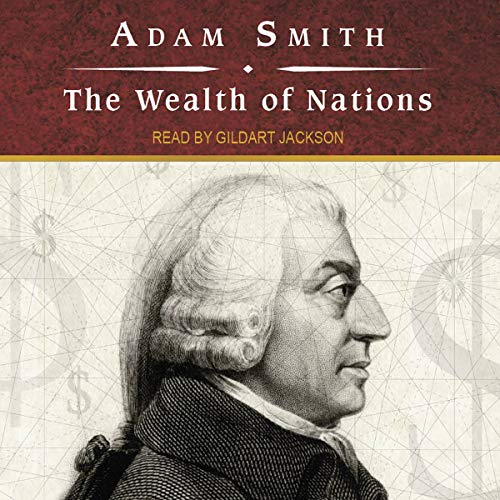
$0$25.79
The Wealth of Nations
The Wealth of Nations summary & excerpts
The Wealth of Nations by Adam Smith Narrated by Gildert Jackson This unabridged audiobook was produced in the year 2010 by Tantor Media Incorporated, which holds the copyright thereto. Introduction and Plan of the Work The annual labour of every nation is the fund which originally supplies it with all the necessaries and conveniences of life which it annually consumes, and which consist always either in the immediate produce of that labour, or in what is purchased with that produce from other nations. According, therefore, as this produce, or what is purchased with it, bears a greater or smaller proportion to the number of those who are to consume it, the nation will be better or worse supplied with all the necessaries and conveniences for which it has occasion. But this proportion must in every nation be regulated by two different circumstances, first by the skill, dexterity, and judgment with which its labour is generally applied, and secondly by the proportion between the number of those who are employed in useful labour and that of those who are not so employed. Whatever be the soil, climate, or extent of territory of any particular nation, the abundance or scantiness of its annual supply must in that particular situation depend upon those two circumstances. The abundance or scantiness of this supply, too, seems to depend more upon the former of those two circumstances than upon the latter. Among the savage nations of hunters and fishers, every individual who is able to work is more or less employed in useful labour, and endeavours to provide, as well as he can, the necessaries and conveniences of life for himself and such of his family or tribe as are either too old or too young or too infirm to go hunting and fishing. Such nations, however, are so miserably poor that from mere want they are frequently reduced, or at least think themselves reduced, to the necessity sometimes of directly destroying and sometimes of abandoning their infants, their old people, and those afflicted with lingering diseases, to perish with hunger or to be devoured by wild beasts. Among civilized and thriving nations, on the contrary, though a great number of people do not labour at all, many of whom consume the produce of ten times, frequently of a hundred times, more labour than the greater part of those who work, yet the produce of the whole labour of the society is so great that all are often abundantly supplied. And a workman, even of the lowest and poorest order, if he is frugal and industrious, may enjoy a greater share of the necessaries and conveniences of life than it is possible for any savage to acquire. The causes of this improvement in the productive powers of labour, and the order according to which its produce is naturally distributed among the different ranks and conditions of men in the society, make the subject of the first book of this inquiry. Whatever be the actual state of the skill, dexterity, and judgment with which labour is applied in any nation, the abundance or scantiness of its annual supply must depend, during the continuance of that state, upon the proportion between the number of those who are annually employed in useful labour and that of those who are not so employed. The number of useful and productive labourers it will hereafter appear is everywhere in proportion to the quantity of capital stock which is employed in setting them to work, and to the particular way in which it is so employed. The second book, therefore, treats of the nature of capital stock, of the manner in which it is gradually accumulated, and of the different quantities of labour which it puts into motion according to the different ways in which it is employed. Nations tolerably well advanced as to skill, dexterity, and judgment in the application of labour have followed very different plans in the general conduct or direction of it. And those plans have not all been equally favourable to the greatness of its produce. The policy of some nations has given extraordinary encouragement to the industry of the country, that of others to the industry of towns. Scarce any nation has dealt equally and impartially with every sort of industry. Since the downfall of the Roman Empire, the policy of Europe has been more favourable to arts, manufactures, and commerce, the industry of towns, than to agriculture, the industry of the country. The circumstances which seem to have introduced and established this policy are explained in the third book. Though those different plans were perhaps first introduced by the private interests and prejudices of particular orders of men, without any regard to, or foresight of, their consequences upon the general welfare of the society, yet they have given occasion to very different theories of political economy.
How to listen to The Wealth of Nations for free
To listen to The Wealth of Nations audiobook for free, please follow these easy steps:
- Visit Audible's trial page
- Click on Try Audible Free
- Login to your Amazon account or create a new one
- Start your free tial (1 month for free, cancel anytime)
- Search for The Wealth of Nations in the search bar, click on Try for $0.00
- Start listening, and enjoy 2 audiobooks of your choice
P.S. You will still be able to keep and access these 2 audiobooks even after your trial ends.
Disclaimer: Some of the links on our website may be affiliate links, so we may earn affiliate commissions.
The Wealth of Nations sample
This sample is narrated by a real person
FAQ
Most asked questions about The Wealth of Nations
More from Adam Smith
The authors' 3 popular audiobooks
- The Wealth of Nations
- The Wealth of Nations
- The Theory of Moral Sentiments
More from Gildart Jackson
The narrators' 3 popular audiobooks
- Tai-Pan
- Another Girl
- Songbird
Playback Speed Calculator
Calculate The Wealth of Nations length with the given playback speed
Calculated Time
Saved Time
36:43:00
00:00:00





